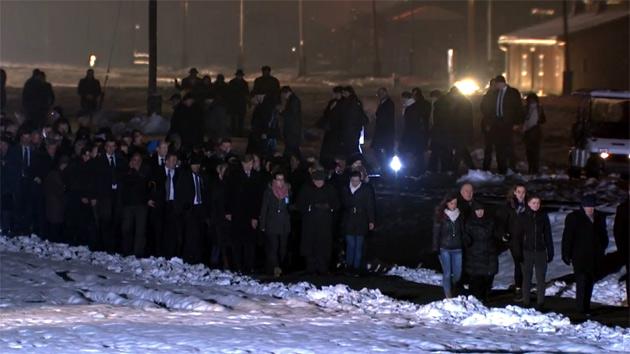Today’s commemoration of the 70th anniversary of the liberation of Auschwitz, held at the former Nazi extermination camp, was a challenge to the world not to forget the horrors of the Holocaust or allow them to be repeated. The Nazis murdered more than 1.1 million people, most of the Jews, in the camp, as well as Poles, Roma and Soviet prisoners of war.
"The silence of the world led to Auschwitz. We must stand up to this as much as we can," declared Ronald Lauder, chair of the World Jewish Congress, about the rising numbers of anti-Semitic attacks in Europe and the world, as well as threats against Israel. Common prayers by Christians and Jews were heard during the ceremony.
"From the place where civilization collapsed, where human beings were reduced to tatooed numbers… we condemn all manifestations of hatred, anti-Semitism and xenophobia," announced the host of the event, Polish President Bronislaw Komorowski. "One nation must never be allowed to develop at the cost of another… Let’s remember what the violation of the rights of nations to self-determination, or the violation of the principle of the inviolability of borders can lead to, what contempt for human life and passivity in the face of evil can lead to."
The floor was then mainly given to the former prisoners. "I died of fear here countless times. I was afraid they would incinerate me, that I would never experience the kisses of love," Halina Birenbaum confided in those assembled, recalling the barbed wire, the barracks, the curses, the beatings, the cruelty, the death sentence that could come at any time, the columns of fire and the thick black smoke from burning bodies as trains brought more and more victims in. After she was rescued by Soviet soldiers she wanted to forget everything before she realized that "only in my memories can I be with the ones I love – and warn against evil."
"The only way out of here is through the crematorium chimney," former prisoner Kazimerz Albin recalled an SS commander saying to the first Polish prisoners at Auschwitz. "Those words came true over the next four and a half years with an iron consistency."
"One minute in Auschwitz was like a whole day, one hour was like a whole year, and a day was a whole eternity. Seventy years later, I cannot forget the horrors I experienced for one moment. I will never have a good night’s sleep as long as I live… Today I can hear the cries of children being torn from the arms of their mothers," said survivor Roman Kent, who called on world leaders to teach their children tolerance, love, and resistance to hatred. Even in the hell of the Holocaust, each individual had the option of making a moral choice – and those who helped save the Jews were like lights in the darkness to Kent. "We survivors share a common aim with this generation and the next one. We do not want the future of our children to look like our past," he said to thunderous applause after warning against concealing the truth, distorting it and denying the past and the Holocaust.
The past of Auschwitz was then shown in the film "Auschwitz", produced by Steven Spielberg, who also attended the commemoration and made a contribution to the collection to ensure the future functioning of the museum there.
"Because I was a Jew, [the Nazis] sent me first to the ghetto in Łódź and then to Auschwitz. I survived because as a young boy I had applied to be an apprentice fitter," said Michal Salomonovič, one of the surviving Czech prisoners to attend today’s commemoration, which was held inside an enormous tent near what used to be the "Gate of Death" in Birkenau. "Even in the ghetto I was basically a worker for the German Reich, but I didn’t help them much," he told the Czech News Agency.
"Ten years ago the liberation celebration was attended by around 1 500 former prisoners, today there are 300 of them. This is probably the last big anniversary we will celebrate in the presence of such a large group of survivors. The witnesses are still among us and we must ask what will happen in the future, whether we are capable of taking on this responsibility, whether we have understood their message," said the director of the Auschwitz Museum Piotr Cywiński.
While Russian President Vladimir Putin sent the head of his office, Sergei Ivanov, to the Auschwitz ceremony, Ukrainian President Petro Poroshenko attended in person. The Czech delegation was led by Czech Prime Minister Bohuslav Sobotka.
